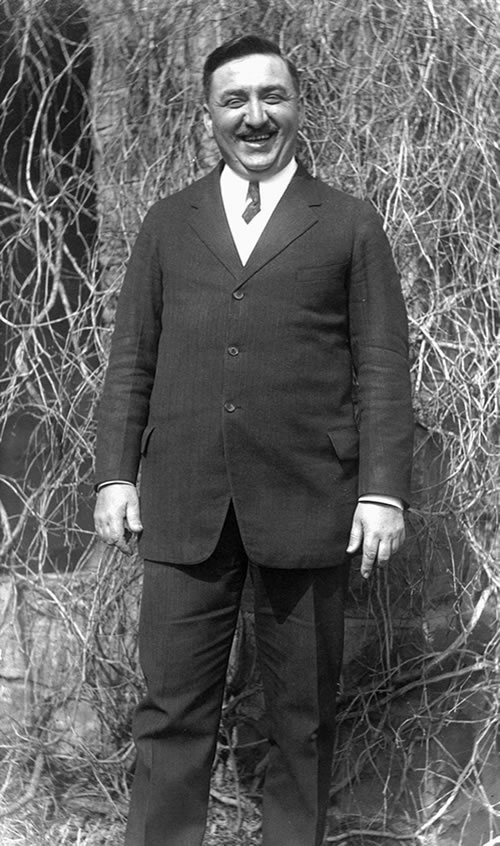“Rev. Paul Rader, president of The Christian and Missionary Alliance, had planned a big evangelistic campaign in [St. Louis]. A board tabernacle, seating about two thousand, had been erected especially for the meetings. At the last moment, Rev. Rader could not go, but he wired Dr. Forrest, insisting that he take his place and asking him to send a photograph of himself to advertise the meetings.
“Since Dr. Forrest did not have a recent picture, he had to have one made. While the photographer was taking pictures, Dr. Forrest told him a funny story. As they laughed uproariously, the photographer snapped the shutter. Dr. Forrest was grinning so broadly that fourteen of his teeth showed. He enclosed the grinning photograph with the others as a joke.
“Imagine his amazement and chagrin when he arrived in St. Louis and found that that was the photograph that was being used. Everywhere he turned, he looked at that grin. It looked more like a comedian than a preacher. Ten thousand little hand cards had been printed, a blotter on one side and that grin on the other, along with the hour of the service and the place of meeting. These had been distributed all over town. Larger posters were on fences and telephone poles and everywhere one could be tacked up for blocks and blocks around the place where the services were to be held.
“One day while in St. Louis, Dr. Forrest had occasion to go down town–to a bed company that made pushback beds such as were used at that time in Stewart Dormitory. When he got off the trolley car at the nearest point to the plant, he noticed a fellow wrapped around the lamppost on the corner. Seeing that the man was drunk, he walked right on by, only to hear him call, ‘Shay, wait a minute.’
“Dr. Forrest didn’t want to stay there and get mixed up with a drunkard, so he took a few more steps. But the man called again, ‘Wait a minute. Please. I beg you, wait a minute. I know you.’
“Dr. Forrest could never resist the plea of a person who seemed in distress. So he went back, thinking he might help the man. As he approached, the drunkard drawled, ‘I knowed you the minute you got off that car.’
“‘You don’t know me.’
“‘Yesh, I do. I have you pikshur right here in my pocked.’ He pulled out one of those little hand blotters with that grin on it. Dr. Forrest was so surprised to see it that he didn’t know what to say. The drunkard continued: ‘Shay, I want to ashk you a queshun. I want to ashk you if you’ll tell me how to be happy like that, becaush I’m miserable.’
“Dr. Forrest talked to him for a while, but he was so drunk he couldn’t understand much. Finally, Dr. Forrest said, ‘Where do you live?’ The fellow told him, but he didn’t know much about the streets, so he said, ‘If you’ll show me how to get you there, pal, I’ll take you home.’
“‘I sho wou’ appreshate it.’
Dr. Forrest unfolded him from around the lamppost and wrapped him around himself and started off. He almost carried the man for two or three blocks. When they came to his house, Dr. Forrest knocked on the door. A nice looking lady answered the knock. She was the man’s wife and was humiliated by his condition. In the meantime, he’d slumped down on the steps. Between them, they got him onto his feet, into the house, and on into the parlor.
“Dr. Forrest sat down and began to talk with the two of them. As the conversation continued, the man sobered. Dr. Forrest took a Testament out of his pocked and read passages to him, talked with him, and prayed with him. The man accepted Christ right there. Because he had been so drunk, Dr. Forrest could not put too much dependence in his conversion. However, he did know that the man was sober and seemed to mean what he said. The wife was a paroxysm of tears most of the time. She was ashamed and also hopeful; she was already a Christian. It was pathetic to see her and hear what she said.
“Dr. Forrest went on his way. About two years later, he was back in St. Louis and had occasion to go to that same bed factory. When he alighted from the car at that corner, he could not help remembering the last time he had been there. He looked at the lamppost and by impulse decided he would go find out how that drunken fellow got along. He still did not know the street or number, but after carrying the man home, he surely remembered how to get there.
“He found the house and knocked, and the same lady came to the door. She knew him instantly. ‘Oh,’ she cried, ‘there’s nobody in the world I’d rather see. Come in.’
As they entered the parlor, she said, ‘I want to show you something.’ She pointed to that little blotter with that silly grin propped up against the clock on the mantle.
“‘Oh,’ remonstrated Dr. Forrest, ‘you don’t want a grinning comedian like that.’
“‘Grinning nothing. That’s what attracted my husband to you. He wanted to be happy that way himself.’
“‘Well, what became of him?’
“‘What became of him? Oh, I wish he were coming home now. Can’t you stay until he gets home? He’s a happy Christian. He was saved that day. He’s never touched a drop of liquor since, and he works down at the city mission. He tells other men how to be happy.’
(text from Achieving the Impossible with God by Lorene Moothart)
